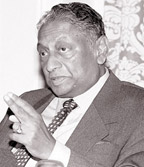|
DAILY NEWS ONLINE |
|
|
|
OTHER EDITIONS |
|
|
|
|
|
|
|
|
|
OTHER LINKS |
|
|
|
|
|
|
  |
The political contradictions of Lakshman KadirgamarThe full six months after his cruel assassination there is no end to the outpouring of grief and tributes to the memory of former Foreign Minister Lakshman Kadirgamar. If at all the flood tide of encomia seems to have gathered further momentum.
Among those who have paid tribute to the former minister are those who have never penned an appreciation in their lives. World leaders and diplomats, the good and the great and the humble have all been united in their sorrow. If our democratic and republican times have ever produced a secular saint, it is Lakshman Kadirgamar. The Kadirgamar commemoration issue of 'Lanka Outlook' a publication of the International Foundations of Sri Lankans (IFSL) is a compendium of the tributes paid to him by International figures, feature articles in newspapers and other such writings since his killing. As the magazine explains in an editorial comment the late Minister had been closely associated with, if the highlight of which had been an inspirational address on the theme 'Global Impact of International Terrorism under the auspices of the Royal Institute of International Affairs and the IFSL at Chatham House, London in 1998. Among the tributes collected in this volume in order of appearance are those by Bandula Jayasekera, H. L. De Silva P. C., S. L. Gunasekera, V. S. Sambandan, Sir Adam Roberts, Carlton Samarajiva, Peter Jay, Padma Rao- Sundarji, T. M. Deen, Dr. Rajasingham Narendran, B. Bamau and Neville Ladduwahetty. The two most remarkable features of Kadirgamar's public life and outlook was that he belonged to the elite as opposed to the masses and that he was a relentless critic of the LTTE's terrorist methods. As a Tamil and a Christian he was quite untypical of the average mass politician but the very fact of his withering criticism of the LTTE made him popular with the Sinhala masses gripped as they were by feelings of being besieged by the hostile LTTE propaganda. By the same token he became the LTTE's prime hate figure and target. As H. L. De Silva notes perceptively Kadirgamar took pride in the fact that he could not be labelled or rigidly classified in the routine way. "He was a true cosmopolitan in spirit. In the best sense of that term, one who was free from narrow national limitations... While acknowledging his sense of justifiable pride in the traditions and cultural inheritance as a Tamil, he declined to be confined by any ties of tribalism and exclusivity." This is correct but since although born in Jaffna he had his entire education and upbringing in the South and overseas, Kadirgamar was to suffer some of the emotional deprivations which come from an immersion in a cosmopolitan non-Tamil milieu cut away as he was from the roots and anchor of a Jaffna Tamilian ethos. This was what separated him from the mainstream Tamil nationalism of the LTTE which although expressing itself in political violence had by the time of his return from abroad become the main discourse of Tamil politics. It was also this which made him an untypical Tamil politician (different for example from Mr. Anandasangaree who too is critical of the LTTE) and which made him with his considerable cerebral gifts the sharpest ideological critic of the LTTE. The circumstances of his political advent also confronted Kadirgamar with another contradiction. As Foreign Minister he had to maintain excellent relations with the international community but often had to be critical of Governments which treated the LTTE with kid gloves and turned a blind eye to its propaganda and fund-raising activities in their countries. As H. L. de Silva notes he realised both the futility of appeasing the rebels as well as deluding ourselves that foreign countries would be so generous or altruistic as to pull our chestnuts out of the fire. No external help would ever be forthcoming except in terms of a quid pro quo which could only be debilitating of Sri Lanka's sovereignty, says de Silva. In that sense six months after Kadirgamar's killing and a new Government in power the scenario has not changed. The former Foreign Minister, as an editorial in 'The Hindu' reproduced here notes, expressed repeated misgivings about the February 2000 ceasefire agreement 'brokered by Norway granting too many concessions to the LTTE'. Now not only is there no progress on the peace process but there are fresh outbreaks of violence on the part of the LTTE while the Sri Lankan armed forces are themselves feeling the strain of maintaining the fragile truce. Padma Rao-Sundarji, the South Asia Bureau Chief of the German Magazine Der Spiegel who was the last journalist to interview Kadirgamar two weeks before his death credits him with two statements "If the ceasefire - no matter how tenuous - holds, the Tigers will tire of war preparedness and will negotiate. But all it will take is the killing of one important person and it's back to war." That important person was Kadirgamar himself but the truce held and is still holding although only just. But what will tomorrow bring? |
|
|

